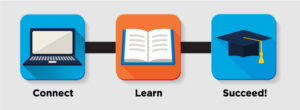Whether your distance learning course is for business or pleasure, it can be a nerve wrecking experience, particularly if you have been out of formal education for a while. Below are a few tips to get you organized and ready for the start of your course.
1. Find a place to study
This is most important.
Ideally, you will have a private space where you can study in peace and quiet but this is not always available so just make sure family know to keep their distance when you are working.
For your study space, you will need a good sized desk (you may need to spread books out), a good chair (you will spend many hours in it so make sure it is comfortable and supportive) and some shelving space for books and stationary.
You will almost certainly need a computer as well, but we will cover this later.
2.Check what materials you will need
Your course providers will most probably send you a list of all the materials necessary in terms of books. Ensure that you buy any books well in advance and give them a quick flick through. In terms of stationary, the following will cover most courses;
- Pad of A4 paper
- Several pens
- Several pencils
- Highlighter
- Ring binder
If your course requires more specialized equipment, they will let you know, however, if in doubt your course providers will be more than happy to help so give them a ring.
3. Pick a time to study
Not all study times are equal, and as a distance learner you will be fitting your study around other commitments be they work, family or both.
There is no point deciding to study once the kids are in bed if by then you are exhausted and unable to concentrate.
Your course provider will be able to tell you roughly how many hours of study you will need to do each week so see where you can fit those hours in.
4. Give all your materials a go over
This means checking you have everything you need, writing down the contact details of your tutor, having a preliminary read through any books and checking your course timetable.
Making sure you are comfortable with everything will make life easier once your course actually starts and will give you time to contact your course provider with any questions.
5. Computer Study
These days a computer is pretty much necessary for any type of distance learning and chances are you have one anyway.
Some courses will have their own website, you should take the time to check this out in advance often there will be forums where you can contact other students for help and advice.
You will probably need word processing software for your course particularly if there are essays involved, check which programs are compatible with your course provider, you can splash out on an expensive program but there are also some free ones available on the internet which are just as good.
Some courses will require you to install other software which may cause compatibility issues with your operating system, if in doubt your course provider will almost certainly have their own IT department who will be able to guide you through any issues.
Hopefully, once you have prepared, you will be feeling less nervous about your new course of study. Remember your course provider will always be there to answer any questions you may have at any point during your course.

